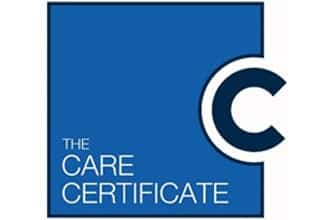What training do I need to become a carer?
Estimated reading time: 10 minutes

Learn how to become a care worker
Have you ever wondered what training you need to become a carer? You’re not alone. Caregiving is a rewarding but demanding profession, and having the right care training is essential to excel.
Whether you’re considering a career change or looking to start a career in care, understanding the training requirements is the first step.
This guide will explore the essential carer training and qualifications you need to become a proficient and compassionate carer.
Table of contents
Check bonus points: How to apply to a UK Care homes that has sponsorship

The Care Certificate –Full Package – £49.99
You get 15 online training courses that are the recommended CPD approved training.
The care certificate is a good starting point.
Who is a carer and what do they do?
A carer is someone who provides unpaid or paid care and support to a family member, partner, friend, or child who has a disability, illness, mental health condition, or needs extra help as they grow older.
A carer’s role can involve:
- Providing personal and medical care – such as dressing, bathing, feeding, giving medication, changing bandages, etc. This often includes emotional care and reassurance too.
- Helping with day-to-day tasks – such as cooking, cleaning, shopping, paying bills, etc.
- Helping the person get around, communicate, engage in hobbies, and stay mentally and physically active. This may involve adapting activities or coordinating accessibility needs.
- Monitoring health needs – keeping track of symptoms, coordinating medical appointments and care services, administering treatments.
- Providing transport and helping run errands.
- Managing household affairs – finances, legal matters, housing issues.
The level of care provided depends on the individual’s needs. It can range from a few hours per week to intensive round-the-clock care.
But in all cases, a carer takes on important responsibilities that help maintain health, safety and quality of life. Their compassionate support is invaluable but often unseen.
Common Job Titles for Paid Carers in the UK
Some common names used for paid carer roles in the UK include:
- Care Assistant / Support Worker
- Caregiver
- Home Care Assistant
- Personal Assistant
- Community Support Worker
- Support Care Assistant
- Healthcare Assistant (HCA)
- Nursing Auxiliary
- Care Practitioner
- Home Help
- Domiciliary Care Worker
- Care Provider
- Enabler
- Outreach Worker
The terms can vary a bit depending on whether the carer works for the government/NHS, private agencies, or directly for the person needing care.
But in general, names like Care Assistant, Support Worker, Home Care Assistant refer to paid staff who provide personal/medical assistance to clients living independently or in residential facilities.
The core responsibilities of these roles are quite similar – providing hands-on care based on an individual’s needs.
But different labels are used frequently in job listings and by organisations. So you trying to become a carer or becoming a support worker, put this in mind.
Knowing other names for carer roles can be helpful when searching or applying for these vital NHS support positions.
What training do I need to be a carer?
With so many vulnerable people in society, from young children to disabled adults, carers play such an important role in many families around the UK.
Although being a carer is a lot of hard work and dedication it is immensely rewarding.
So, if you’re looking to become a carer, whether you’re leaving school or looking for a change, you’ll need training and hopefully, the article will help you make the right decisions before you set off on your exciting new journey.
Is a career in caring right for me?
With many different sectors within social care to choose from and the prospect of helping people of all ages and abilities, caring can sound very appealing.
However, the truth is that caring is not for everyone and before even considering training you need to ask yourself if caring is the right job for you.
If you’re not sure, the best option is to try voluntary work. There are plenty of websites to help you with this, such as the NCVO and Do-It websites.
Your local library could be worth visiting too. Aside from that, it gives you plenty of experience and a taste of what it’s like. Of course, you’ll have to be CRB (Criminal Records Bureau) checked first.
Training Opportunities for Social Care Work
Perhaps you’re absolutely certain that a career in caring is for you. Let’s take a look at the training you’ll need to become a carer. Having a working knowledge of the social welfare system is key but many social care jobs don’t require you to have a formal qualification in this subject.
Reading up on the topic is a good idea but in most cases, you’ll pick it up on the job.
Jobs will often give you the opportunity to undergo courses whilst you work allowing you to attend college or university on day release.
There are part-time foundation and induction courses available as well as none-exam-based National Vocational Qualifications (NVQs) that cover subjects like Care and Management or Health and Social Care. Degrees are available for high-level qualifications too.
Start Now – THE FULL CARE CERTIFICATE COURSE- ONLINE COURSE
Skills needed to become a carer
Aside from having training for the carer role, it is important you also develop your soft skills:
- Caring – Wanting the best for people
- Communication – Clear speaking and listening
- Patience – Staying calm and unrushed
- Organisation – Keeping good records
- Fitness – Ability to safely move people
- Attentiveness – Noticing subtle health changes
- Calm – Able to properly act in crises
- Responsibility – Ensuring care excellence
- Flexibility – Tailoring care individually
- Enthusiasm – Dedication to keep learning
- Integrity – Always doing right thing ethically
- Teamwork – Cooperating closely with colleagues
- Problem Solving – Working out solutions
- Respect – Honouring dignity in all actions
The best carers balance being kind with strength, focus and responsibility. This makes them truly needed and important part of health, safety and wellbeing for those relying on at home care.

Care can be rewarding
The Care Certificate
Whilst formal qualifications are not essential, one thing that you are required to undertake is the Care Certificate. This is a set of standards that you must adhere to if you are to be a social care worker.
These requirements are set out by Skills for Care and Health Education England. We offer an online Care Certificate training course which covers all 15 standards of the care certificate.
Here is a list of only the standards covered in the Care Certificate:
- Understand your role
- Your personal development
- Duty of care
- Equality and diversity
- Work in a person-centered way
- Communication
- Privacy and dignity
- Fluids and nutrition
- Awareness of mental health, dementia, and learning disabilities
- Safeguarding adults
- Safeguarding children
- Basic life support
- Health and safety
- Handling information
- Infection prevention and control.
Click to Buy – The Care Certificate – Full Package
Certification
As mentioned before, formal qualifications are not essential in becoming a carer, however, they do help with job prospects and future progression.
They also help you to carry out your role more efficiently and provide higher quality care. Here at Caring for Care, we offer a wide range of care courses that help you meet CQC standards.
These include:
- Anaemia Awareness
- Autism Awareness
- Basic Life Support
- Breakaway Training
- Catheter Care Training
- Dementia Awareness
- Diabetes Awareness
- Dignity In Care
- Effective Communication
- Effective Record Keeping Training
- Epilepsy Awareness
- Epilepsy Medication Training
- Equality & Diversity Awareness
- Fire Safety Awareness
- Infection Control Level 1
- Learning Disability Awareness
- Managing Challenging Behaviour Training
- Nutrition & Hydration Awareness
- Pressure Sore Prevention Training
- Risk Assessment
- Safeguarding Vulnerable Adults
- Safeguarding Vulnerable Children
- Safer Handling of Medication
- Safer People Moving & Handling 1 Day
- Safer People Moving & Handling 2 Day
- Safer People Moving & Handling Refresher
- Stroke Awareness
The best place to start if you want to move into a career in health and social care would be to complete The Care Certificate e-learning course.
This will give you a solid foundation of knowledge to begin a new carer.
Click to Buy – The Care Certificate – Full Package
Alternatively, we offer a huge range of courses for individuals to help you get started, both face to face and E-learning.
Why not check them out.
For Face to Face courses, held at our head office in Stoke on Trent – visit our public course section
For e-Learning courses, you can complete anywhere – visit our online course page
You can check out our post on the importance of e-learning in developing careers in Health and social care.
Carer Career Progression
So now you know what you need in terms of training, what are your prospects like? When you start out as a junior care worker, you’re likely to be on a salary of up £19,000.
Although the national average salary in 2024 based on 23 salaries is £22,638 in United Kingdom according to Glassdor.
UK Talent puts the salary at £24,375 per year and £35,544 per year for the most experienced. This was based on 10,000 job posted.
This can progress to £21,000 and even £25,000 if you progress to a specialist support worker.
Good luck in whatever area you choose and if you require more help then please don’t hesitate to contact us on 01782 563333 for a friendly chat.
Additionally, familiarise yourself with the seven (7) essential aspects to be aware of regarding the Care Certificate.
How to get a sponsored Carer job in the UK
How to get a sponsored Carer job in the UK
Staying well-informed, communicative and prepared regarding lawful visa process makes attaining a sponsored UK care role very feasible.
- Research Care or Nursing Homes
Search job sites and care home webpages for ones clearly stating they sponsor foreign workers. Make lists of these targeted opportunities. You can check the list of care jobs offering sponsorship here. - Check roles that are to be filled
Note which roles they seek to fill, expected credentials/experience required and locations. Assess your fit.
Study to meet training standards expected for UK carer positions.
Be ready to take extra courses when you arrive if needed. This shows you are committed. - Prepare your application documents and apply.
Translate any work references, school certificates etc you want to show UK employers into English using official translators.
Also, tailor your CV, cover letters and interview answers to emphasise your transferable skills suiting UK care needs. - Discuss your Visa needs when applying and during interview
Let the employers know about needing skilled visa sponsorship and realistic start dates to meet immigration rules on their side. Show you understand requirements.
You can look at interview tips in health and social care. - Widen options by checking large care homes
Consider large care home chains, managed groups of homes, or major home care agencies who regularly handle staff work permits. Note places with international staff already. - Check work and Visa contracts
Accept contract terms to repay training/visa costs if you leave shortly after the employer sponsored you.
This reassures their UK investment in you meets regulations.

Care means being kind and helpful to keep someone or something safe, comfortable, and happy.
FAQs on Post
There are no mandatory qualifications on how to become a carergiver or carer, but training shows you can do the job. Many employers require a care certificate, NVQ or equivalent qualification.
Are there age restrictions for pursuing a career as a carer?
There are typically no age restrictions. However, those under 18 may face limitations around medication administration, insurance etc. Core values like maturity are key.
Is formal training required, or can I gain experience through on-the-job training?
Formal training is highly recommended to gain necessary skills. However some employers provide on-the-job training if new to the field. Note that, a formal training is not compulsory.
Are there specific laws or rules for caregiver training, and how can I make sure I comply with them?
In the UK, the Care Certificate meets key legal and regulatory training requirements. Other local standards may apply.
Do yearly refresher courses to renew first aid, CPR, or other core knowledge certificates.
Attend short workshops to build skills – like for dementia care, nutrition, proper lifting etc. Add to what you can do.
Gain extra training in specialized areas like stroke, palliative care, managing diabetes. Become an expert care partner.
Read caregiving newsletters, blogs and magazines. Learn evolving best ways to give care.
Join caregiver social media groups. Swap first-hand work advice with peers for new solutions.
References
A Career Change – http://www.acareerchange.co.uk/changing-career-becoming-carer.html
NVCO – https://www.ncvo.org.uk/ncvo-volunteering
National Careers Service – Careers advice – job profiles, information and resources | National Careers Service
Glassdoor: https://www.glassdoor.co.uk/Salaries/carer-salary-SRCH_KO0,5.htm
UK Talent: https://uk.talent.com/salary?job=carer
Let us Help you
We’ll help you find the right course for your needs. Tell us a little bit about your situation and what you would like to achieve.
We’ll get back to you within one working day.
